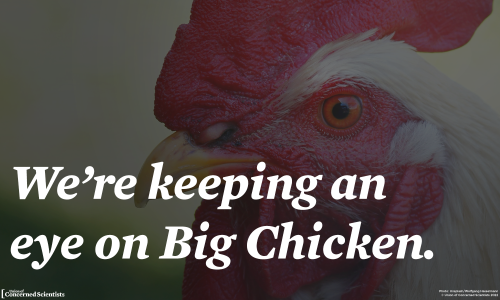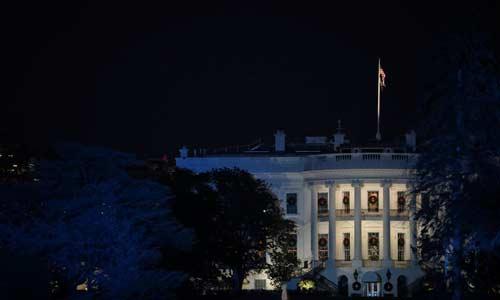When big companies make the rules, everyone else suffers.
Fairness and justice should be important to all of us, especially when it comes to something as fundamental as the food we eat. But for too long, a small number of very large meat and poultry companies have had unchecked power to make billions in profits while harming consumers, farmers, workers, and local communities. Antitrust regulators have turned a blind eye while Tyson Foods and others have gobbled up the competition and now control most of the industry. This extreme corporate consolidation has put smaller companies and farmers out of business, exploited and endangered meatpacking workers, concentrated enormous amounts of waste that poisons our water and land, and allowed these large companies to conspire to fix prices and gouge consumers.
There's no shame in working hard to become the biggest and best—if a company plays by the rules. But monopolistic meat producers don't. In a country that was built on competition, it shouldn't be this way.
Tyson Foods: one of the worst
A decades-long process of deregulation in the meat industry that began in the 1980s has given a handful of meat and poultry producers near-monopolistic control of the industry. Just four beef processors—Cargill, JBS, National Beef, and Tyson Foods—control 85 percent of the market. But one stands out for its unprecedented power and the damage it causes: Tyson.
Tyson is the largest food company in the United States, with annual revenue of more than $52 billion. It processes one of every five pounds of chicken, beef, and pork sold in this country, and even if you don't buy Tyson-labeled products in the grocery store, it can be hard to avoid them. Tyson supplies meat served in many schools and fast-food chains—including every McDonald's chicken nugget—and owns a slew of popular brands including Ball Park, Hillshire Farm, Jimmy Dean, and Sara Lee.
Tyson embraces a chicken production system called "vertical integration." It essentially means the company owns every part of the production process—the birds, the feed, the transportation, and the processing plants. Tyson has little competition to worry about at most points in its supply chain. It can set the market conditions in which it operates, including unsafe conditions for its workers and air and water contaminated by chicken waste.
Tyson's market domination allows it to set the price of chicken for restaurants, grocery stores, and other buyers, and to squeeze out costs in its supply chain by stiffing workers and farmers and polluting communities, all while top executives and shareholders make billions.
Science reveals the effects of Tyson's near-monopoly
A series of Union of Concerned Scientists (UCS) investigations revealed the scope of Tyson's control over our food and farming system. The most recent, released in 2024, used publicly available data to show that Tyson processing facilities dumped more than 371 million gallons of wastewater directly into US waterways between 2018 and 2022. This wastewater contains nitrogen and phosphorus (which can deplete oxygen in waterways and harm marine life), animal parts and byproducts including blood and feces, and pathogens and microorganisms such as E. coli and Enterococcus. More than half of this toxic brew was concentrated in just three states: Nebraska, Illinois, and Missouri (in order of pollutant load). However, the data we were able to review represent only a fraction of Tyson's total pollution. That's because only 300 of this country's 7,000 meat processing businesses are subject to regulations that require them to report their discharges, and because Tyson and other giant meat companies procure their animals from CAFOs (confined animal feeding operations), which are themselves significant sources of pollution.
Tyson's supply chain is another source of pollution. A 2022 UCS analysis of Tyson's land use estimated that, in 2020, it took 9 to 10 million acres of land—an area roughly twice the size of New Jersey, and the equivalent of about 5 percent of all US corn and soybean acres planted that year—to grow feed for all the animals Tyson processed. As UCS has previously shown, today's industrial corn and soybean farming practices tend to erode soil, pollute drinking water supplies, fuel coastal dead zones, and leave farmland and surrounding communities vulnerable to extreme weather. With leverage over so much farmland, Tyson has an opportunity and a responsibility to ensure that land is farmed more sustainably.
A 2021 UCS analysis showed that Tyson operates as a near-monopoly in its home state of Arkansas, accounting for more than two-thirds of the state's poultry processing and 100 percent of the processing in seven counties. Tyson's increasing stranglehold on the industry since 1978 has coincided with a loss of half the poultry farms in Arkansas. That has happened even as the number of chickens raised in the state in a given year has risen 1,000 percent.
At the same time, a joint five-month investigation conducted by UCS, Venceremos (a worker-rights organization in Arkansas), and the Guardian newspaper found that Tyson employees work in an atmosphere of fear and intimidation, with few benefits or COVID-19 protections, a punitive points-based system that pressures them to work when sick, and unacceptable risks of bodily injury. Many of Tyson's employees are immigrants who have little choice but to accept the dangerous working conditions and pollution in their neighborhoods because they have no power to negotiate better conditions, and their employment options are limited.
Consumers deserve more control over their food choices
All of us—consumers, community members, workers, farmers, and scientists—have enormous power if together we demand fairness in the food system. Public pressure can push the US Department of Justice and the US Department of Agriculture (USDA) to strengthen and enforce antitrust rules that promote fairness and keep companies like Tyson in check. The Biden administration took some steps to improve competition, investing $1 billion in financing and other assistance for smaller-scale meat and poultry processors and providing more ways for farmers to get their products to market in a way that's good for workers, communities, and the environment. But additional federal action is needed to break the near-monopoly power of Tyson Foods.
Everyone deserves affordable food produced in a sustainable and equitable way, but policies that maintain the outsize power of companies like Tyson contribute to keeping good food out of reach for too many people. Reining in consolidation and increasing competition can help bring better food choices to consumers at all income levels. Individual choices matter, too: try buying directly from independent farmers or smaller-scale processors at farmers markets or through community-supported agriculture (CSA) arrangements.
Act now to help make our food system fairer and more sustainable, and to hold Tyson and other companies accountable for their actions.




